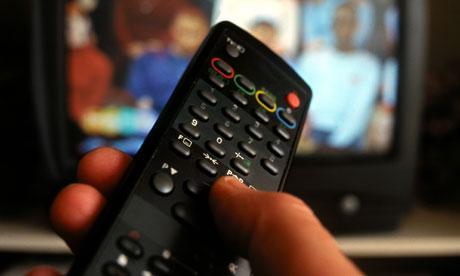 Binge viewing is when you control what you watch and when you watch it
Binge viewing is when you control what you watch and when you watch it
The problem with binge viewing is that it isn’t really a problem. It represents another shift of control from producers to consumers thanks to technology. It also violates our mental model of ‘TV viewing.’
Binge viewing is watching more than one episode of an episodic show when you want to. There is no stated quantity that transforms the experience from ‘watching’ into a binge event that I know of. Apparently its when other people think you’re watching more episodes than they think you should. On-demand viewing does represent another step toward consumer empowerment and has producers scurrying, often quite creatively, to retain some power in their corner to keep viewers engaged and revenues flowing.
Why are we calling it ‘bingeing,’ clearly a negative term, in the first place? We should pay attention to the power of words and the implicit message about social norms or even commercial norms. We don’t call it a binge if we hide away to read a novel for a day, watch back-to-back football games, the finals at the US Open or listen to a single artist’s work. We might call it a festival, a marathon or a tournament, but not a binge. The term ‘bingeing’ is saved for media that we have only recently been able to watch at our pleasure, rather than by allowance of the networks. Clearly bingeing has negative connation, somewhere between gluttony and addiction. Why is that? Television has been under the controlled by the producer, not the consumer, until the introduction of DVRs and streaming services such as those offered by Netflix and Amazon. We’re used to having the control over our consumption of other media, such as music or novels. But not television. That violates our mental model of ‘television watching’ and some social norm with moral overtones.

Dickens had the audacity to release more than a season’s worth of content at once when he published Great Expectations’ chapters in their entirety. OMG. How can we control ourselves? When Netflix released House of Cards all at once, it triggered a lot of discussions ranging from how this was destroying the artful suspense created by the producers, the episodic integrity planned by the creators, the timeline of the TV storyworld or that, tsk, tsk, this behavior just shows that people just need instant gratification these days. Do they forget that people who want suspense can turn it off? How little credit we give our fellow remote holders.
There is no doubt that watching a series of episodes of a show can have psychological effects.
- The ability to continue the story creates a greater sense of immersion and transportation into the narrative, making it more enjoyable.
- Increasingly complex and nuanced storylines can be better appreciated in marathon viewing where context is maintained.
- Watching a show you like by choice can reduce stress. Any activity that is a stress reliever is a positive behavior. Lowering stress has many physical and emotional benefits, both short and long term.
- The ability to watch multiple episodes means you’re no longer frustrated and feel manipulated by ‘to be continued’ endings or advertising break cliffhangers. Producers have to treat viewing audiences with more respect. Being treated with more respect improves your watching experience.
- Television or movie viewing is often a social activity. Shows with fan followings are often shared at the time of viewing with friends and can be shared again online, increasing the social connection.
- When we watch something with characters that are relatable, the characters become social actors to us. We develop relationships with these characters that feel real in the sense that time spent watching a show is time spent with friends, so our sense of connection is further enhanced.
- Watching several episodes of a show or series only decreases our enjoyment when we become tired of watching it. We must learn, if we haven’t already, to determine our own level of engagement and entertainment pleasure.
- For parents: seeing kids watching several episodes of a TV program shows you what the kids like and gives you a chance to ask kids what they like about it and maybe even join in the viewing. This allows you to have a more meaningful conversations about the show and characters as well as the viewing style. If it’s something you think has questionable values, then you can reframe the show as you see it and ask their kids to share how it looks to them. If you like the show, it gives you a common ground—something that is very valuable when your kids hit the teenage years–to introduce your concerns about marathon viewing, balance and self-control, and to more authentically set limits.
As with all activities, it’s important to have balance. With freedom, comes responsibility. Too much of any activity can be a problem when it negatively interferes with other things in someone’s life, such as work, schoolwork, relationships or health. When people choose media entertainment over all else, that’s a problem. When they consistently lock themselves away to watch all the episodes of any show, it’s time to ask questions and potentially intervene. Excessive media use of any kind, whether it’s TV, Facebook or reading novels, that interferes with other aspects of life is often a symptom of depression, loneliness or feeling out of control in their environment. A bit of escapism is healthy. It is relaxing and rejuvenating. At the same time, we all need to identify priorities for ourselves, to learn to self-regulate and to manage our time. People can use media to self-medicate when they are lonely, depressed or unhappy. If the use is problematic, it will be a reflection of other issues across life domains, not caused by a weekend of watching Game of Thrones or Breaking Bad.
Having TV-on-demand gives people more control. Individual agency, research shows, can enhance self-efficacy, which increases resilience and other positive emotions. Positive emotional experiences, even something as simple enjoyment from a TV festival, can have multiple psychological and physiological benefits. But more importantly, TV viewing on demand is about choice and experience. It allows us to redefine culture and create new understandings of media experience and in response, TV programming is evolving too. We have to make choices all the time with much larger consequences than deciding how many episodes of Downton Abbey is a good idea. I’m in favor of teaching and practicing those skills rather than delegating them to network scheduling.
–
Photo sources:
Remote shutterstock photos
Pickwick Papers: http://www.pbs.org/wnet/dickens/life_publication.html

